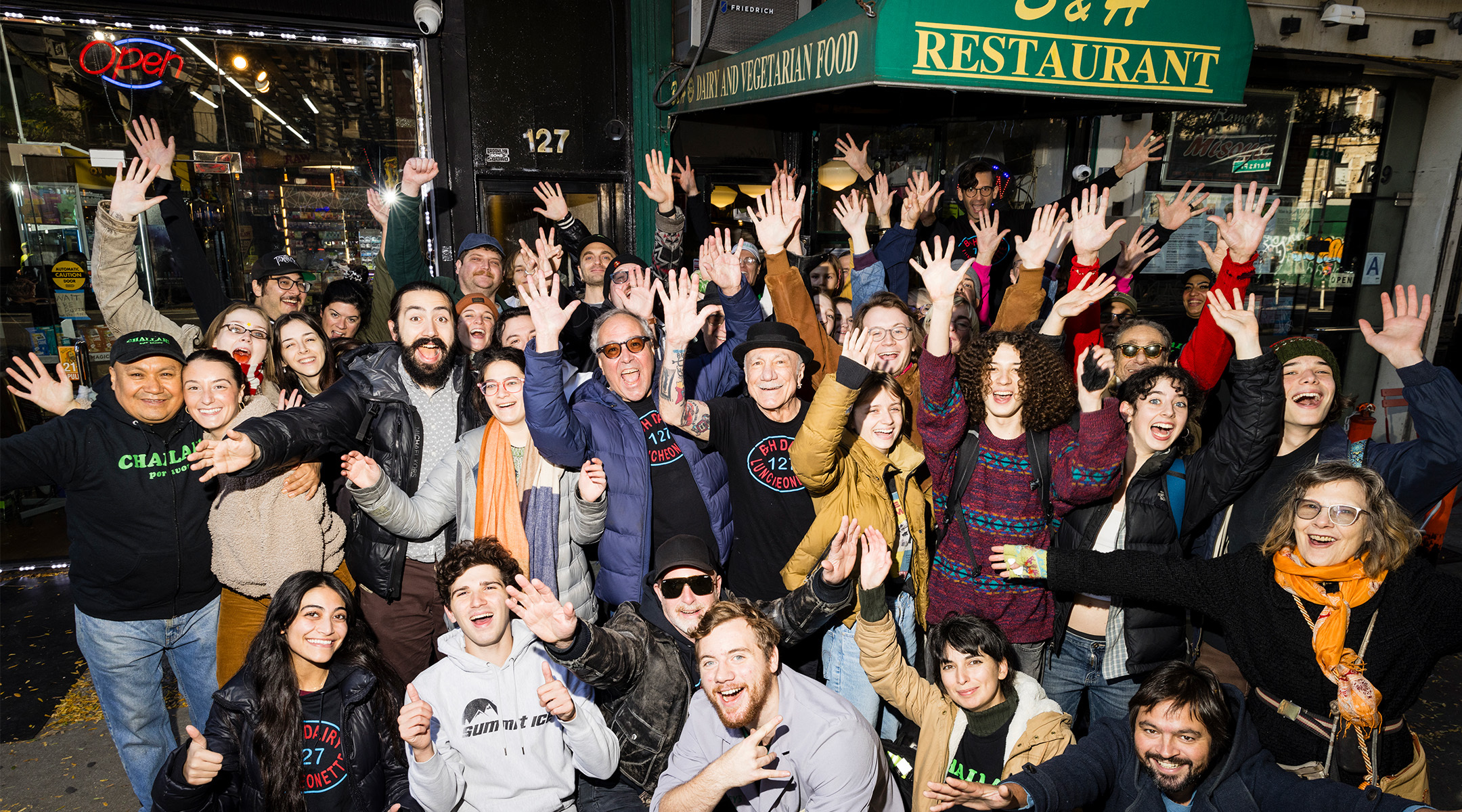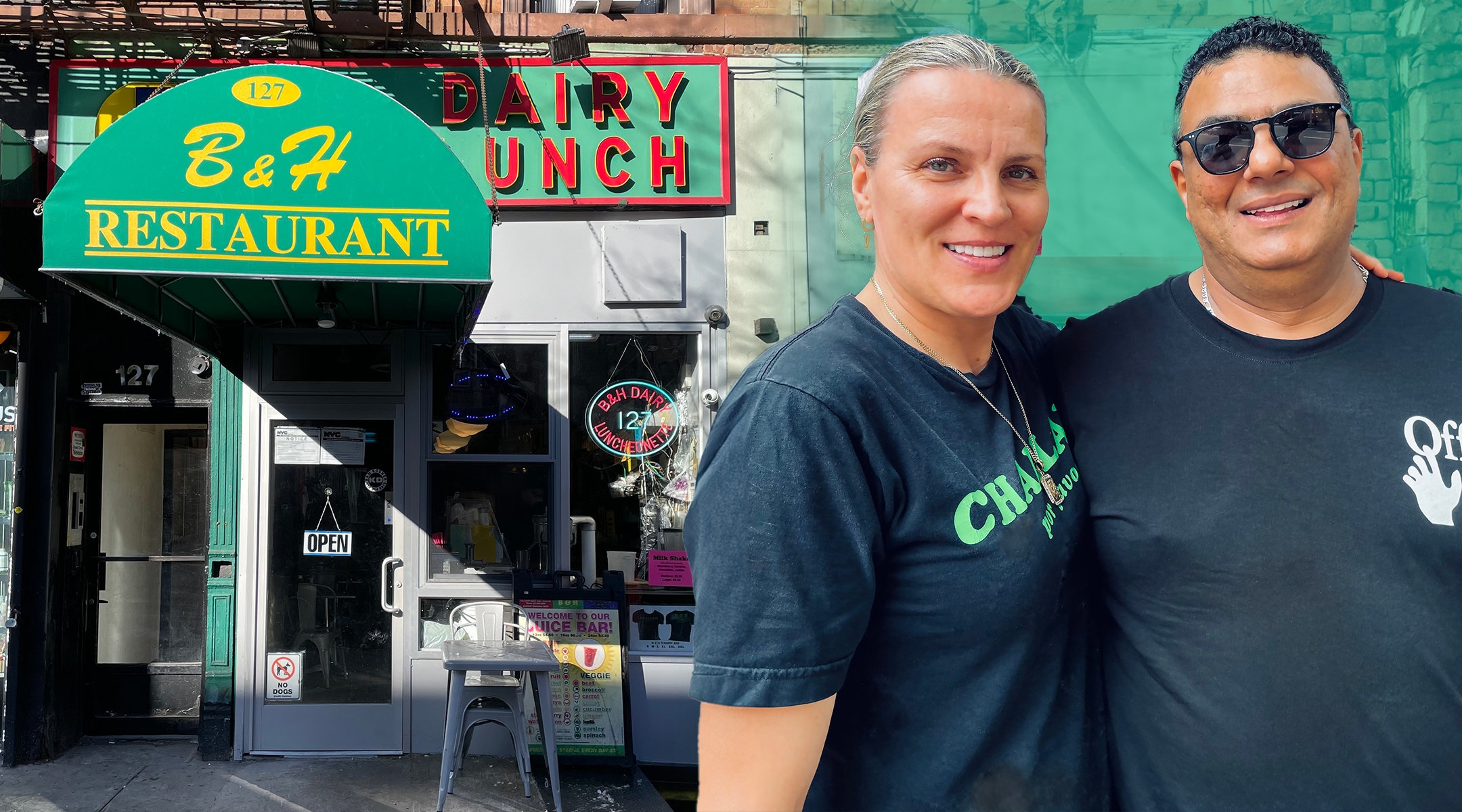(New York Jewish Week) — B&H Dairy Kosher Restaurant wasn’t particularly remarkable when it opened on Second Avenue in 1938. At the time, kosher dairy restaurants were commonplace in Manhattan and Brooklyn, particularly on the Lower East Side.
But now, B&H Dairy is something of an anomaly: The tiny eatery is one of the city’s few remaining kosher dairy lunch counters. The restaurant’s name comes from the last names of its original owners (Abie Bergson and Jack Heller), but at some point in the 1940s or 1950s morphed into standing for “better health.” The menu includes traditional Eastern European comfort food, such as matzo brei, blintzes and borscht, plus veggie burgers, omelets and house-made challah.
While its menu is largely unchanged from 86 years ago, everything around the restaurant has been transformed: Once a popular destination for Yiddish theater, Second Avenue and its environs fully gentrified in recent decades, with sky-high real estate prices to match.
And yet, despite the changes in the neighborhood, B&H is more committed than ever to remaining old-school. In 2022, the Ashkenazi-oriented eatery was the only New York restaurant to receive a Backing Historic Small Restaurants grant from American Express and the National Trust for Historic Preservation. With the monies received, Fawzy and Aleksandra “Ola” Abdelwahed, B&H’s proprietors since 2003, have upgraded the restaurant’s exterior by making it look more like it did back in the day.
In January, the restaurant unveiled its upgraded but old-time façade. The owners commissioned a replica of the restaurant’s original rounded, green awning; created a fresh version of the green signage attached to the facade that reads “dairy lunch” in red lettering alongside a blue and yellow logo that proclaims “better health,” and recreated an old oval neon sign with the restaurant’s name and street number, 127.
“People have emotional connections to restaurants,” Seri Worden, senior director of preservation programs at the National Trust for Historic Preservation told the New York Jewish Week. “These are places you go to for celebrations. They are part of your daily routine. When your favorite deli closes, you feel a little bit gutted.”
The $1 million program, which launched in 2021, allocates $40,000 annually to 25 different historic restaurants in the U.S. with the aim of aiding these generally small, family-owned businesses with recovery from the COVID-19 pandemic.
“We want these places to thrive and do well and look great,” Worden said.

It’s a tradition to take a group shot of customers standing outside the restaurant for B&H’s annual calendar. The 2025 calendar will feature the upgraded exterior; this photo was taken in November 2023. (Jackson Krule)
B&H’s Andy Reynolds, who describes himself as the restaurant’s “jack of all trades,” started working at the restaurant in 2015 after being a long-time regular with a penchant for ordering the cheese omelet and toasted bialy.
Reynolds learned about the grant opportunity on Instagram and helped the Abdelwaheds apply. The application detailed how they would use $40,000 — which, in addition to the new awning and signs, would fund a new door, windows, sidewalk seating and a security gate.
“I did not believe it,” Fawzy Abdelwahed said about learning B&H had been awarded the grant. “We were in Turkey on vacation for the first time in 20 years when [Reynolds] called.” The Abdelwaheds are the restaurant’s fourth owners, and though they are not Jewish — Fawzy is Turkish and Ola is Polish; they met in the East Village when Ola was a waitress at the nearby and now-shuttered Stage Restaurant — they remain committed to preserving the food and traditions of the luncheonette, which draws a mix of Jews and non-Jews, tourists and East Village denizens.
“People come to this cozy, tiny restaurant alone and they get a little family feeling,” Fawzy said. “It means a lot.”
Just one week after Reynolds’ happy call to the Abdelwaheds on vacation, the restaurateurs had a check for the first installment of their grant. Unfortunately, the rest of the process wasn’t as smooth. While the grant was awarded in June 2022, it took 18 months to get all the permits approved — that’s because the New York City Landmarks Preservation Commission has numerous requirements before renovations can proceed on landmarked buildings. They demanded architectural drawings for the entire restaurant, not just the sections that were being updated. It was an expensive and time-consuming process for the couple, who own the restaurant but not the circa-1900 building in which it resides.
Finally, in December 2023, B&H started its facelift.
“As it does with all businesses located in landmark buildings, LPC worked closely with B&H Dairy to ensure the work was both appropriate to the building’s historic character and reflected the business’s modern needs,” a spokesperson for the Landmarks Preservation Commission told the New York Jewish Week. “We look forward to seeing this beloved neighborhood establishment continue to thrive and contribute to the local community for years to come.”
At just 400 square feet and only 12 feet wide, B&H is tiny: Customers and staff need to turn sideways in order to walk past the lunch counter. The restaurant can seat 22 people inside and eight more outside on the sidewalk patio in good weather. But its limited table space isn’t the only reason B&H is always crowded — New Yorkers are extremely loyal to B&H, its food, its owners and its history.
In 2015, a building on the corner across the street had a gas explosion. Businesses on the entire block were closed for five months as city inspectors went through every building. It was a hard time for B&H, but Reynolds said some days they’d find a $20 slid under the door from a customer, which gave them a boost.
And, of course, the restaurant closed for eight months during the pandemic, sustained by more crowdfunding, grants, the addition of delivery apps to its offerings and landlords who granted them a lot of grace. Then, it was reconfigured with covered outdoor seating that was removed to complete the 2023-2024 renovation.
“You have to show her some love, particularly after the pandemic,” Ola Abdelwahed said about the investment in the restaurant, which she refers to as a “her.”
B&H’s customer base runs the gamut in true New York fashion. Parents of NYU students often send their kids B&H gift cards to make sure the kids eat something other than pizza, Fawzy said, adding that many celebrities, including Lily Tomlin and Sarah Silverman, have lived in the building upstairs over the years. (Silverman remains a loyal supporter of the eatery, calling it “my favorite restaurant in New York City.”) Many employees have been working the counter for 15 or 20 years, and some customers have been patronizing the restaurant even longer.
The neon sign that was recreated had not glowed since the 1970s, but its likeness lived on, particularly on T-shirts sold by the restaurant. Since 2014, they’ve sold more than 5,500 pieces of merchandise, according to Reynolds. In addition to the neon-sign shirts, there are the “Challah, Por Favor” shirts and the annual calendar featuring photos of customers, including one group shot with dozens of customers gathered out front. The Abdelwaheds look forward to the photo shoot for the 2025 calendar, which will feature the new signage.
“Now B&H is shiny, and people are so excited with the neon sign,” Ola said. “They say, ‘It is like my hoodie.’”
Customers have also appreciated that the small restaurant is warmer in the winter and more energy-efficient since getting the new windows and doors, Reynolds said.
While the Backing Historic Small Restaurants grants are not “life-changing money,” Worden said that the recognition and advertising that comes with the donation can give small businesses a boost. Certainly, the Abdelwaheds are optimistic about how the shiny new storefront will help solidify B&H’s legacy for the next generation.
“When we were closed, I was depressed,” Ola said. “B&H has been through all these hard times. This grant was a miracle that let us give her the love she needs. We are taking care of a beloved restaurant.”
The New York Jewish Week brings you the stories behind the headlines, keeping you connected to Jewish life in New York. Help sustain the reporting you trust by donating today.





